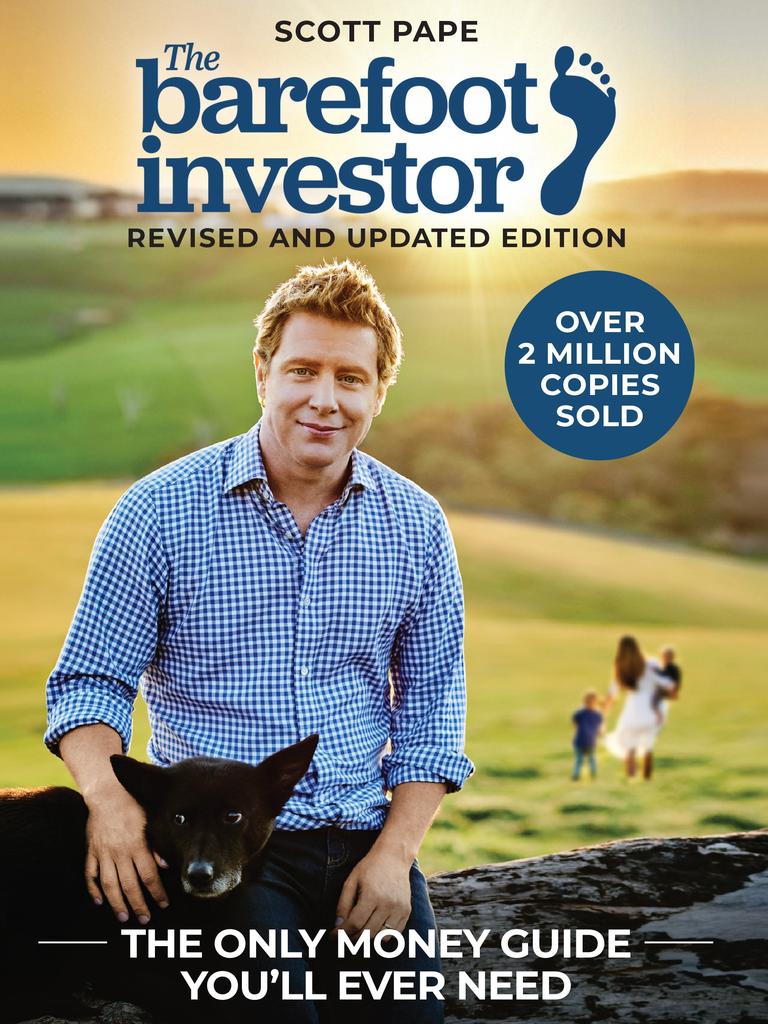Barefoot Investor reveals how to stop scammers accessing your credit file
Scott Pape says there is a fast, easy and free way to stop scammers running up credit in your name. Here’s what the Barefoot Investor recommends you can do.

Business
Don't miss out on the headlines from Business. Followed categories will be added to My News.
Today I’m going to show you the exact steps that will stop scammers from running up credit in your name.
Best of all, it’s fast, easy, and free.
Yet before I do, I want to take a moment to reveal the name of a company that made MILLIONS from the Optus Hack.
That company’s name is Equifax and they’re a credit bureau.
This week, in a blind panic, Optus agreed to purchase 12-month subscriptions to Equifax’s ‘Credit Protect’ service for their most affected customers.
This service sends an alert if your credit file is accessed (by a scammer applying for credit in your name using stolen docs), and it costs $14.95 a month per person.
That’s not just a huge amount of dough for Equifax, it’s insanely great advertising to boot!
So let me square the ledger …
Equifax is the financial equivalent of Mark Zuckerberg. They hoover up your personal private credit information, and sell it off to any financial institution they damn well please. Yet unlike Zuck, if you want to monitor who they’re pimping your private data out to, well, you have to pay them $14.95 a month*!
*Except you don’t.
I’m afraid Optus has been scammed again.
They didn’t need to pay Equifax all that money. There’s a much better workaround, and it’s free.
I want you to pay close attention to this, even if you aren’t an Optus customer. After all, just this week Standard and Poor’s came out saying that Aussie banks are among the most vulnerable to a cyber attack in the region because of their work from home policies and all the stuff they’ve got in the cloud.
Bottomline?
This isn’t the first mass hack, and it won’t be the last.
Now, I don’t think simply having an alert on your credit file provides you enough protection.
Here’s the way I think about it:
An alert is like having a security camera on your front door.
You’ll get an alert that you’re getting robbed … but your TV still gets flogged!
If you are scammed – and one in four Aussies have been – it can take upwards of 30 hours to sort everything out, (most of which involves sitting in long telephone bank cues, listening to Daryl Braithwaite’s Horses.)
Instead, what you want is a big arse lock on your door that makes it impossible for the robber to get in your house.
Thankfully there is one app that will let you put a lock on your credit file.
That company’s name is Credit Savvy, and it’s a division of the Commonwealth Bank. (The fact that they’re owned by big yellow gives me a certain level of comfort … though I still wouldn’t trust them educating my kids).

Creditsavvy bills themselves like a fitness coach for debt, which in itself is kind of weird. Their schtick is that they calculate a personal ‘credit score’, which for me is about as useful as the score I give my four year old daughter’s nightly dance concerts:
“10 out of 10 Honey, BRAVO!”
In both cases we’re just needy adults desperately trying to keep your attention. (CreditSavvy makes its money by selling leads to finance companies to get you into debt).
However, part of their app that I’m interested in allows you to lock your credit file with a swipe or click of a button.
So here’s what I want you to do, step-by-step to lock down your credit file so that scammers can’t rip you off.
Step 1: Download the CreditSavvy app (either in the Apple or Google app stores).
Step 2: Verify your details (I used my drivers licence and Medicare card).
Step 3: Press “protect” from the bottom navigation.
Step 4: Press “Request a ban”. Credit Savvy will then let the other credit agencies know you’ve got a ban on your file within 2 business days.
Step 5: On the 16th day the CreditSavvy app will remind you that your pause is ending. When you get that alert – and this is important – click “ban my credit report for 12-months”.
And that’s it!
From then on if anyone tries to access your credit file, the CreditSavvy app will alert you.
Though it will also be locked so the bank or financial institution won’t be able to access your file. However, this will not count against you. To be clear, it will not harm your ability to take out credit.
Now if you are applying for credit (or say moving home and applying for utilities and the like), all you need to do is temporarily lift the ban on your credit file for a week or so. And then put that lock straight back on using the CreditSavvy app.
Tread Your Own Path!
A FOLLOW UP TO THE BAREFOOT INVESTOR BOOK?
Dear Barefoot,
I have read your original book four times, well, the audio book that is. It was excellent and I attribute it to my strong financial position today. But what now? We recently have moved into free housing provided by our work and are earning collectively $400,000 a year now - we have all our buckets set up, we have $80,000 in savings, $30,000 in index funds and our is super set up for success. We even called a financial advisor to get specific advice, but he was more about borrowing and he recommended we read the Barefoot Investor (I’m glad it was a free appointment!). So again I ask, what now? Is there a book 2.0 for those who followed your advice and are now reaping the rewards?
Clint

Hi Clint,
First up, well done for sitting through my audiobook four times: that thing goes for like 6 and a half hours!
You’ll be hearing my voice in your sleep!
It’s a timely question you ask, because I’ve just finished writing a companion to the Barefoot Investor. It’s called: Beyond Barefoot: The Next Chapter.
I wrote it to mark the 10-year anniversary of sitting down with my wife at the Romsey Pub and sketching out the Barefoot buckets with Liz. It’s written especially for Barefooters, and there are three brand new Barefoot date nights, and a brand new bucket as well.
However, I won’t be selling it in bookstores.
Instead, I plan to give it away as a free bonus for people who pre-order my new book. If you’re interested you should ensure you are signed up to my email newsletter before next week, because that’s the only place it’ll be available, and only for that week!
WE ARE TERRIFIED
Scott,
My husband is retiring this week. We are not sure if we should withdraw his super or leave it in his fund. We would place it in a high interest account if that is the better choice. We are terrified the market is going to keep going down. What should we do?
Linda & Steve

Hi Guys,
It’s been a rough time. I can understand how stressful it must be for you.
First up, you should not panic and take your money out of super. When you are in the retirement pension phase, your income is tax free and protected in the case of bankruptcy. Besides, you can put some of your super into a high interest cash and fixed interest account within your super.
And that’s exactly what you should be considering doing. In my book I suggest people a few years out of retirement to start building up a cash buffer of a few years’ living expenses (minus any pension payments), so that you have enough money to ride out downturns like we’re experiencing.
Many people in your boat are taking on a lot of otherwise ‘hidden’ risk in their super funds because of large unlisted assets, and overly aggressive one-size-fits all portfolios. So you should definitely call your super fund and tell them you’re freaking out about the market, and sit down with one of their financial advisors.
DISCLAIMER: Information and opinions provided in this column are general in nature and have been prepared for educational purposes only. Always seek personal financial advice tailored to your specific needs before making financial and investment decisions.
Originally published as Barefoot Investor reveals how to stop scammers accessing your credit file






